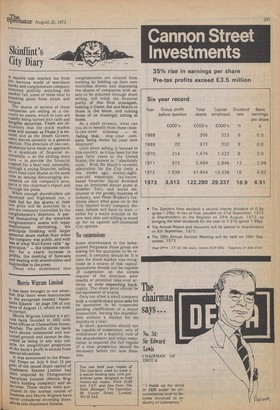Skinflint's City Diary
A squalid .tale reaches me from the nervous world of merchant banks and conglomerate company directors pitifully watching the market fall, some of them near to breaking point from strain and fatigue.
The shares of several of these companies are selling at a discount on assets, which in turn are rapidly being turned into cash and tangible securities. There are indications that the stock market Slide will worsen as Phase 3 is entered and as the Heath Government moves uneasily to a general election. The directors of one conglomerate have made an approach to a syndicate of financial institutions — so the chilling story
runs to provide the financial support for a bear raid, ostensibly through a young financier, selling Short their own shares at the same time as issuing discouraging statements on the company's prospects in the chairman's report and through the press. When enough shareholders are squeezed and frightened out, a cash bid for the shares at their low Price will be launched by a private company controlled by the conglomerate's directors. A partial dismantling of the erstwhile conglomerate's assets will repay institutional borrowing, the Principals finishing with larger Personal share stakes than when the company was public, and with less of what Wall Street calls " aggravation " — the tiresome necessity for a yearly increase in Profits, the meeting of forecasts and dealing with shareholders and busybodies in the press.
Those who understand how conglomerates are created from nothing by bidding up their own worthless shares and depressing the shares of companies with assets to be acquired through short selling, will relish the financial purity of this final stratagem, making it Game, Set and Match to those in the know, and ruining those of us trustingly sitting at home.
As a small investor, what can you do to benefit from these closeto-the-wind schemes — or,
failing that, stop your company being stolen by your own directors?
Until short selling is banned in this country, as it has been for the past forty years in the United States, the answer is, " absolutely nowt." With Mr Heath's reverent admiration for the City (only a few weeks ago, twenty-eightyear-old expatriate, tax-havenbased financier David Rowland was an honoured dinner guest at Number Ten), and bored disinterest in the grubby business of industry, and Peter Walker's fuzziness about what goes on in the City beyond livery company dinners, reform will have to wait — either for a major scandal or for new men able and willing to stand up for us against self-interested City opinion.
No suspensions
Some shareholders in the beleaguered Pergamon Press group are asking for the quotation to be restored. It certainly should be. It is time the stock market was recognised as a source of risk capital. Quotations should not be capable of suspension on the simple request of the directors, poor results or potential take-over activity or even impending bankruptcy. The share price should be the barometer of events.
Only too often a small company with a volatile share price asks for its quotation to be suspended pending clarification of a major transaction, leaving the shareholders without -a market for six months or a year.
In short, quotations should not be capable of suspension, only of withdrawal on a majority vote of the shareholders; and when restoration is required the full regalia of a new prospectus should be necessary before the new flotation.


































 Previous page
Previous page